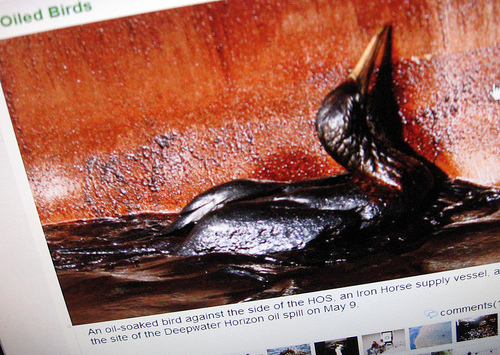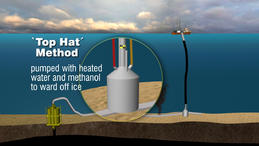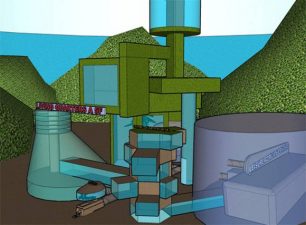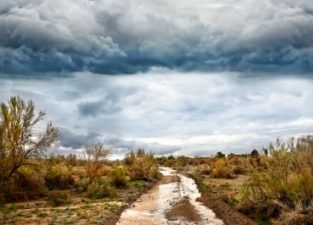 The tragedy of it all- why should they have to suffer? A Russian oil dump in Egypt raises more red flags in Middle East about oil spills and drilling practices.
The tragedy of it all- why should they have to suffer? A Russian oil dump in Egypt raises more red flags in Middle East about oil spills and drilling practices.
The giant Gulf of Mexco oil spill is now more than two weeks old and although intensive efforts are being made to “cap” the well, it is still spewing 5,000 barrels of oil (950,000 liters) per day into the Gulf. The three companies being held responsible are British Petroleum BP (who drilled the well), Transocean (who own the equipment, including the drilling platform), and Halliburton (who serviced the well, including making safety inspections). The environmental damage already done is feared to even surpass the giant oil spill on Spain’s ‘Coast of Death’ in 2002, and the Exxon Valdez in Alaska.
Now the Xinhua News Agency reports that the Egyptian Environment Ministry decided to a Russian ship after it dumped its oil waste into the Red Sea, causing an oil slick that stretched over 1 km off the coastal city of Ras Ghareb in eastern Egypt. An Egyptian chopper spotted the vessel in April. It hoisted the flag of Russia while it was dumping oil waste into the sea water. An Egyptian court has decided to seize the vessel until the fine is paid, the report added.And meanwhile, in the Gulf, oil well engineers have moved on the “plan B” after the large dome-shaped device they had lowered to cap the gushing well failed to work properly due to slush being created by ice forming inside which prevented oil from being siphoned out. The new backup device, being called the “top hat” is a smaller version of the larger one, and will have hot water and methanol brought down to the seabed to prevent ice from forming again.
“Plan B”. Will it work?
The environmental impact of this disaster is now being felt along the Gulf Coast as the oil being released form the well is now coming ashore.
The possibility of a major oil spill occurring in the Middle East is not beyond possibility as off shore oil platforms are common in the Gulf of Suez, the Persian Gulf, and in the Caspian Sea.
An incident that occurred a few days ago, brings this issue even closer to home a few days ago when a Russian oil tanker was fined $108 thousand for dumping its waste oil into the Red Sea off the Egyptian coastal town of Ras Ghareb.
The oil involved was very minor compared to ones mentioned above, but it still was enough to cause a 1 km oil slick.
Nobody wants to think what the environmental results of a major Middle Eastern oil spill would be, but some of our previous Green Prophet articles have touched on the environmental results of drilling for both oil and gas on offshore platforms, including the Hasbah Platform Well No. 6 that blew out in the Persian Gulf in 1980, killing 19 men and spewing out over 100,000 barrels of oil, until it was capped 8 days later.
As environmental lovers, we at Green Prophet have posted articles dealing with possible environmental repercussions from offshore drilling platforms, particularly those now being found in the natural gas fields located in the Eastern Mediterranean and being drilled by Yitzhak Tshuva’s Yam Tethys natural gas exploration company.
This particular article noted that while natural gas is somewhat cleaner than crude oil, it was pointed out that these wells “still result in significant damage to fish and other marine life due to a number of poisons and toxic substances created during the process of natural gas exploration and production, including methane gas, hydrogen sulfide, and other forms of toxins, including that from damaged gas pipelines, which often occurs due to earthquakes, and other occurrences.”
The offshore drilling in the Persian Gulf is an even more serious situation, in light of the above Hasbah Platform incident and from the fact that the fragile eco-balance of marine life there is currently threat, including an incident where a Saudi oil company had to relocate an entire coral bed that was in the way of an oil pipeline.
The sheer number of offshore platforms in the Persian Gulf, point out that much of the oil wealth in the countries in the Persian Gulf region is not just being pumped out of the desert. While the Ras Ghareb bilge spill incident will soon be forgotten (if it hasn’t already) the massive oil spill in the Gulf of Mexico will be on peoples’ minds and will be felt in the pocketbook in states along the gulf coast for many years to come.
Images:
Top: http://www.flickr.com/photos/elycefeliz/4595044995/
Thumbnail: www.foxnews.com
More articles dealing with environmental damage from oil and offshore drilling:
Tshuva Wins Out in Natural Gas But the Environment Suffers
Persian Gulf “Mermaids” Face Environmental Threats
Blame BP for Massive Gulf of Mexico Oil Spill?




